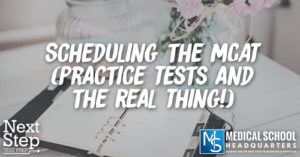
Have you ever wondered how to schedule your MCAT full-length exams and get the most out of practice tests? Phil from Blueprint MCAT (formerly Next Step Test Prep) joins us once again for another episode.
Check out The Premed Years Podcast to help you with your medical school application.
AAMC is soon to release its fourth scored exam. It’s exciting as you get to have a bigger sample of what the writers are actually putting out.
'The more tests you take, the better representation you get.'Click To TweetThe actual MCAT is highly variable. You need to take multiple exams so you get a bigger cross-section of all the things they could be asking about and the ways they could ask about it. There are some topics in the AAMC practice exams that they haven’t asked about.
If you do great on one exam doesn’t mean you’re going to do great on every exam. The actual exam may be different so you need to take lots of exams to get a better representation.
Listen to this podcast episode with the player above, or keep reading for the highlights and takeaway points.
In Phil’s own opinion, as the MCAT changed in 2015, they de-emphasized a lot of areas such as organic chemistry and physics. But they also added a lot more material and less orgo questions now than you do on the MCAT even though the new MCAT has twice as many questions.
When the new MCAT came out, they needed to put out a bunch of practice questions so students will have an idea of what the exam was going to be like. That’s when the unscored sample test came out. The reason it’s unscored is that they didn’t have data. Maybe another reason the sample isn’t scored is they really don’t want it to be scored.
'As the MCAT changed, they needed to release a bunch of materials. They also had a bunch of leftover stuff that they weren't using anymore.'Click To TweetPhil thinks that in the sample test and scored test 1, all of the questions are absolutely fine. But there’s a little bit more of Organic Chemistry on those exams in terms of the proportionality of what you expect to see on the actual MCAT. You may expect to see around 11 questions on test day which is a bit higher.
That being said, Phil thinks that each question is great, but it’s the proportionality that he worries about. He expects students to do better on the actual test than the scored test 1. But most MCAT takers would not actually notice this.
There’s also a Chemistry passage on the AAMC full-length 2 that has so few words of about 75.
Phil likes doing the tests in order (1, 2, 3, and assumably 4). In terms of spacing, you want to have a week between each one.
Take an exam and spend a day or two reviewing it. That tells you some weak areas. In the next four or five days, work on those weak areas and then take another exam.
That way, you’re constantly improving from one exam to the next. Make sure that you’re growing from each test.
'Use the exams as diagnostic tools.'Click To TweetTake the unscored test if you want to get extra practice. You should see all of the AAMC exams at some point. It’s okay to take the sample test and break that up. Also, if you want to break one up into chunks, this is additional practice using the sample test.
So if you’re taking one exam per week, that’s four weeks. And that fits really well as you think about what you’re going to be doing a month before the exam.
Phil noticed there are no exam dates in February and there’s only one Saturday in January that’s available. That’s a bit unusual compared to what we’ve seen in the last years.
If you’re planning to take the test on that Saturday in January, think ahead and be really aware. As of this recording, they haven’t opened registration for it yet.
But Phil can see a bull rush occurring on that Saturday. Students may try to get that test date because they don’t want to push their test back a couple of months as Saturday is the only day that’s good for them.
The AAMC has gotten a lot better. In 2015 when it changed to the new MCAT, you used to be able to take the MCAT in the morning and in the afternoon because they were way shorter.
'Now that they've gone to a full-day test, they effectively cut their number of seats in half.'Click To TweetFor a couple of years, there was a little bit of chaos as students were trying to desperately get booking at a certain center on a certain date. There were a lot of students who would have to travel in order to take the MCAT on a certain date.
But that’s not ideal. You don’t want to have to fly to Arkansas or some little town you’re unfamiliar with. You don’t know where the testing center is. You’d have to deal with all of that on top of taking the MCAT on that day.
Be aware of this so you can get the testing date you can. Phil just foresees that January Saturday becomes a little bit crazy as students try to book it.
At some point, it gets very disingenuous to the schedule of when students are applying to medical school, when the rolling admissions is, as well as the deadlines.
And when the AAMC releases their MCAT schedule, it shows that the bulk of these tests are in May, June, July, and August. Then the students taking the test are getting behind the curve when it comes to submitting their applications early and getting their test score back. They submit with the scores to know if they should even apply or not.
'Especially the students coming from disadvantaged backgrounds, they're scraping together every penny they have to be able to register for the test.'Click To TweetFor the bulk of students taking it in May and June, most of these students are also in school. They’ve got a big chunk of time that they have to dedicate to finals. They’re spending so much time worrying about finals or their midterms may be overlapping with the day they’re trying to take the MCAT.
Phil likes the January test date because most students don’t have a lot going on, specifically on the first to the third week of January. So this makes it a little bit easier for students as they’re trying to prep their schedule.
'Register early. Seats do go fast.'Click To TweetPhil recommends taking the last full-length test on the last week should be the easiest week of your prep period. Don’t do it in the last two days before the test.
If your test is on Friday or Saturday, if you want to take it on Sunday before that, that’s okay. But even then, that would already be pushing it.
'Take the exam and review it for a day or two and then spend some time working on whatever that exam told them to work on.'Click To TweetThe day before the test is the day you spend making sure that your brain is in optimal condition.
There are days your brain could seem foggy especially if you’re studying a lot. And it turns out that the students study a lot a week before the test. Then they start to feel a little burnt out.
So much of the MCAT is not just memorization. There’s a lot of data analysis, application, and trying to figure out what the passage is saying and what the question is asking. There is a lot of critical thinking and problem-solving stuff. And if you’re burned out and fried, that hurts a lot.
The last two days before the test should be the easiest prep that you’ve done. No big passages. Maybe look some equations or psych vocab or just the little things that don’t really burn you out. The last two days before the test you want to take really easy.
'The last MCAT should be a week before your actual exam.'Click To Tweet[Related episode: The Importance of Reviewing Your MCAT Full-Length Test]
Students who get the MCAT Course from Blueprint MCAT (formerly Next Step Test Prep) get access to all the AAMC materials. They also do live office hours specifically focused on talking through those exams. They do a lot of these as the actual test day approaches.
For the MCAT course, use the coupon code MCATPODCRS to save 50% off. Get to hang out with Phil four days a week in office hours plus tons of amazing video content. You get all the books and access to all the AAMC materials.
Need MCAT Prep? Save on tutoring, classes, and full-length practice tests by using promo code “MSHQ” for 10% off Next Step full-length practice tests or “MSHQTOC” for $50 off MCAT tutoring or the Next Step MCAT Course at Blueprint MCAT (formerly Next Step Test Prep)!

Lorem ipsum dolor sit amet, consectetur adipiscing elit
I just received my admission to XXXXX! This is unreal and almost feels like I am dreaming. I want to thank you for all of your help with my application. I cannot overstate how influential your guidance and insight have been with this result and I am eternally grateful for your support!
IM SO HAPPY!!!! THANK YOU SO MUCH FOR ALL YOUR HELP, IM INDEBTED TO YOU! Truly, thank you so much for all your help. Thank you doesnt do enough.
I want to take a few moments and thank you for all of your very instructive, kind and consistent feedback and support through my applications and it is your wishes, feedback, and most importantly your blessings that have landed me the acceptance!
I got into XXXXX this morning!!!! It still has not hit me that I will be a doctor now!! Thank you for all your help, your words and motivation have brought me to this point.
I wanted to once again express my heartfelt gratitude for your help in providing feedback during my secondary applications. Your guidance has been instrumental in my journey.
Just wanted to share my wonderful news! I received my first medical school acceptance! Thank you for all that you do for us Application Academy!!!
I am excited to tell you that I just got my third interview invite from XXXXX today! I can’t believe it. I didn’t even know if I was good enough to get one, let alone three – by mid-September. Thank you so much for all of your help and support up to this point; I would not be in this position without it!!
I wanted to thank you for helping me prepare for my XXXXX interview. Even in a 30-minute advising session, I learned so much from you. Thank you for believing in me, and here’s to another potential success story from one of your advisees!
I just received an acceptance with XXXXX! This is so exciting and such a huge relief and so nice to have one of our top choice schools! I also received an interview with XXXXX which brings the total up to 20 interviews! Thank so much, none of this would have been possible without you!

Join our newsletter to stay up to date
* By subscribing you agree to with our Privacy Policy and provide consent to receive updates from our company.
Resources
Advising Services
Podcasts & Youtube
Books
About
Deal Lasts for
